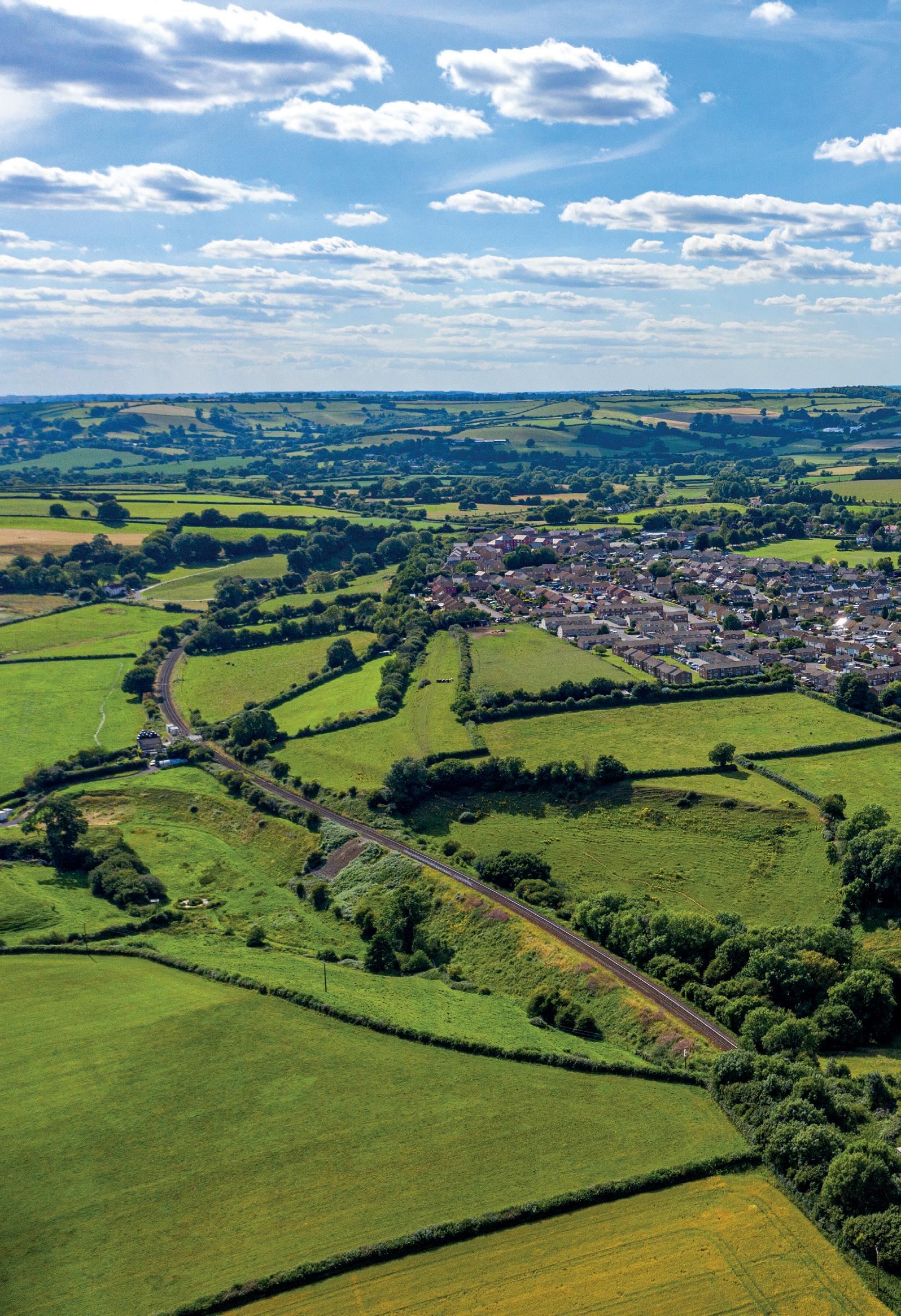
We’ve been a part of the rural community for over 170 years. Securing grants and BPS payments, managing landlord and tenant relationships, as well as selling farms, livestock, crops & machinery.





We’ve been a part of the rural community for over 170 years. Securing grants and BPS payments, managing landlord and tenant relationships, as well as selling farms, livestock, crops & machinery.




Welcome to our annual edition of In the Field where we review hot topics affecting the farming community we live and work in.
We look at the new rules concerning slurry storage, the future of subsidies, and examine the market conditions for the sale of land and farms. It has also been enlightening to catch up with Harriet Pike MRCIS to learn about her journey from graduate to qualified rural surveyor during her time at GTH. 2022 is already shaping up to be a year of change with the updating of rules and regulations; a year where the phasing out of BPS will become much more noticeable to the bottom line and with farmers adjusting to the profitability and viability of farming in their own ways.
GTH is seeing some expansion with the opening of our new North Somerset agricultural office at Redhill, South of Bristol. With Jeremy Bell and the agricultural and planning teams there better able to serve clients in the Mendips and surrounding areas. Get in touch with them on 0117 203 5577 or at farms.redhillbristol@gth.net.

We have a host of experts across Somerset, Devon and Dorset so don’t hesitate to get in touch to discuss any rural matter that is affecting you or your farming business.

If you are considering marketing your property, our agricultural professionals are part of the rural community and are ideally placed to offer you expert advice. From an initial free, confidential market appraisal, a comprehensive plan will be drawn up to provide maximum coverage and visibility to buyers.

Contact one of our team to discuss your options and find out how they will work to get the best possible result for you. Scan here for more information about our services.




www.gth.net


 GREENSLADE TAYLOR HUNT
GREENSLADE TAYLOR HUNT
In the last edition of In the Field, we discussed future Government subsidies following the removal of the Basic Payment Scheme, with no meaningful detail from DEFRA of the schemes available. Twelve months on, what more do we know and can farmers actually begin to evolve their businesses?
The Basic Payment Scheme has now started to reduce, albeit for many it has been a 5-10% reduction in 2021 which has gone unnoticed; partly due to the modest amount and partly due to increasing values of beef, milk, cereals and lamb. However, as the years pass, the reduction will be greater and as input costs soar, margins will begin to be squeezed.
Many clients are now looking to plan for the future without BPS and consider the replacement Government support schemes. As we are well aware, these schemes are focusing on environmental credentials, opposed to agricultural production, although we have still been promised that there is not a conflict between agriculture and the environment, but instead a balance to be achieved. Whilst this remains to be seen, the tide is clearly turning and farmers will need to adapt their practices to receive the support. So, what is coming in 2022?
The Sustainable Farming Incentive (SFI) is the first step of the new programmes under the
transition plan, following a pilot in 2021. In simple terms, SFI is aimed at all farmers of all types, locations and tenures; perhaps to be considered in a similar manner to Entry Level Stewardship of years gone by.
It is intended to be a simple three year agreement with quarterly payments due to commence in 2022. There are proposed to be three levels of involvement (basic, intermediate and advanced) with farmers even able to increase levels during the agreement term as the scheme develops. Flexible and fair appears to be at the heart of this. Perhaps slightly surprisingly, applicants will be able to apply for the SFI, as well as claiming BPS and Countryside Stewardship incomes. In addition, private sector deals to sell environmental outcomes, such as Biodiversity Net Gain or Natural Flood Management, are also permitted.
However, whilst all sounds very positive and flexible, as always, the devil is in the detail. The full details have not yet emerged but information on payments has been revealed:
Grassland Standard:
• Basic Level - £28/ha
• Intermediate Level - £58/ha Arable Standard:
• Basic Level - £22/ha
• Intermediate Level - £40/ha
Are we able to plan now?
The launch is due in early 2022 so watch this space.
The immediate reaction from many has been that payments are low per hectare; certainly there are no jaw dropping headline figures compared to BPS that floated around £220/ha for many years. For an average sized South West holding of 68 hectares (168 acres), the best case grassland income is £3,944. However, whilst the finances are seemingly nothing too exciting, the management requirements to comply do not go far beyond good farming practices which many will be doing unpaid in any case.

Common land will benefit from a data collection version of the SFI. Vast swathes of England’s commons are of high environmental value, but the sheer scale of these land areas results in limited data availability to assess potential for carbon capture and biodiversity enhancement. Funding will be available for a routine assessment of vegetation and soil condition over the three year period. Whilst this may not sound too exciting initially, it will be fundamental to any funding in the future as Higher Level and Higher Tier schemes come to an end.
Slurry management has also been in the limelight recently, following the farming rules for water restricting spreading during many months of the year and anticipated storage requirements being increased to six months under SSAFO. The Slurry Investment Scheme is due to arrive in autumn 2022 with capital grants to enhance slurry stores. Be warned though, this isn’t predicted to solve the slurry
woes for all livestock businesses. Very few details have yet been released, but it appears if your holding is behind current legislation, the Government will not be helping you to catch up.
In amongst this, there are productivity, welfare and diversification type capital grants doing the rounds (such as the Farming Investment Fund). Details will follow at relatively short notice as these schemes open for applications.
Finally the more bespoke Local Nature and Landscape Recovery schemes are coming –but nothing is yet released for discussion.
Future scheme details remain vague, but are slowly emerging. When the Sustainable Farming Incentive is released, take a look at what it means for you, not just the income but also the requirements. How much change would the scheme require?
Countryside Stewardship remains as a legacy scheme – should you be securing a five year agreement with some decent payments, as well as potential for significant capital grant investment?
There is a huge amount of change within the sector currently and our team are routinely reviewing businesses and advising clients. A meeting with one of our advisors to discuss your situation and future options could result in significant financial benefits going forward.






Richard Webber, Partner in our South Molton office, comments on the agricultural land market in the South West, looking back at 2021 and predicting what 2022 may hold in store.
There has been a continued shortage of good quality land and large commercial holdings coming to the market, despite there being plenty of interest and demand for these opportunities. A small 7% increase in the availability of land and farms was reported for the first half of 2021 compared to 2020 levels, although generally in the South West there had been a 22% drop in market activity for the same period, reflecting the limited opportunities available. Nevertheless, Greenslade Taylor Hunt had another very busy year in 2021, successfully selling almost £60M of farms, smallholdings and agricultural land, which was up 43% on the previous year. The actual acreage sold remained fairly constant around 3,000 acres, reflecting the better quality property available and the rising value of farms and land. Analysis showed that serviced holdings with farmhouses and buildings of 100+ acres averaged £14,284/acre, with those in the 50100 acre range averaging £15,448/acre.
Across our area bare land values vary tremendously, with £15,000+/acre being
achieved for arable land in the Taunton and M5 corridor, down to £2,500-£3,500/acre for land on the Somerset Levels or hill grazing on Exmoor. Here in North Devon values are tending to range between £5,500 - £7,500/ acre for decent pasture, with better quality pasture and arable generally £6,500 - £9,000/ acre. There are of course always exceptions to the rule, and these still tend to be dictated by situation and local competition.
With regards farm sales, the highlight of the year was Wonham Barton at Bampton, a superb 293 acre traditional livestock holding which sold well in excess of its £2,945,000 guide price. Other notable sales included Highworthy Farm at Higher Clovelly a 198 acre commercial dairy unit sold in May with a guide price of £2.5M; Craddocks Farm at Babcary a 100 acre residential holding with a guide price of £2.55M; Willicroft Farm at Rackenford, a 106 acre livestock farm guided at £1.485M; the 138 acre Quantock Farm at Over Stowey marketed with a guide price of £1.35M; and the 98 acre Heath Hill Farm at Winkleigh guided at £1.2M. It is an indicator of market strength that almost all of these holdings achieved in excess of their guide prices.
With Brexit now behind us, despite the planned cuts to BPS and increasing input costs, improved yields and strong agricultural






commodity prices have undoubtedly provided a confidence boost, with adjoining and local farmers, landowners and agricultural businesses keen to snap up larger blocks of land. How long this confidence will last remains to be seen, with the Sustainable Farming Incentive (SFI) and ELM’s ‘public money for public good’ schemes unlikely to offer the same income as BPS and average annual agricultural input inflation currently running at over 20%. Nevertheless, genuine opportunities to expand for most are rare, sometimes once in a lifetime, and where possible need to be exploited by those who are committed to the industry long term.

Sales of development land continue to provide roll-over funds, and this has undoubtedly played an influential role in the sale of larger farms. Land owning also remains an attractive option when it comes to capital taxes and the threat of the Government revising the associated reliefs seems to have diminished, at least for the time being. We continue to experience an ever widening purchaser base for land and farms, and it is
likely that these factors will maintain, and quite possibly increase, values over the short to medium term. The ever present demand for lifestyle farms has been further heightened by the pandemic and the need to find space, privacy and solitude for one’s personal health and well-being is a principle aim of many purchasers relocating to the South West. Demand from the environmental sector for tree planting, carbon off-setting, carbon sequestration and rewilding are likely to have a major influence on land values in the years to come. Of course, smaller land parcels generally sell to non-farming buyers, with a whole raft of weird and wonderful potential end use ideas.
At this early stage of the year we are already receiving very strong levels of enquiries from prospective purchasers seeking large, good quality commercial farms and blocks of agricultural land and this bodes well for those farmers who may ultimately decide to come to the market in 2022.

The Environment Bill requires all development to provide a BNG (Biodiversity Net Gain) of at least 10% to offset any harm to local wildlife generated by a development. This is good news for wildlife but also presents an opportunity for landowners who can offer up land for BNG and phosphates offsetting, as well as Sustainable Alternative Natural Greenspaces (SANGS)
GTH has unrivalled access to a number of developers seeking land for BNG, phosphate (nutrients) and SANGS offsetting The type of land that may be suitable is that which is not suited to development and where the land can be put aside for such purposes on a long term basis

If you have land available, please get in touch and we can advise on the potential opportunities. Interested parties should contact Claire Alers-Hankey (01823 334466), James Wotton (01392 908777) or Philip Hodgkin (01460 238383).

This has certainly become a hot topic over the last few months which was triggered by an announcement from DEFRA in the autumn of last year together with recent on farm inspections by the Environment Agency.
DEFRA’s recent announcement reaffirmed the rules under the ‘Farming rules for water’ which states that it is not permitted to apply organic manures (FYM, slurry or biosolids) to land where there is no nutritional requirement for the crop at the time. In addition, regardless of whether or not your farm lies within an NVZ (Nitrate Vulnerable Zone), it should have at least four months’ worth of slurry storage.
During the autumn and winter season, there are very few crops that DEFRA consider have a nutrient demand and therefore justifying spreading in this period is very difficult. Understandably, this raised concern with many farmers who do not currently have sufficient storage for the four-month period over the autumn/winter season.
This regulation is not new but has not necessarily been policed in the past, and the regulation is now being interpreted on a stricter basis because water nitrate and phosphate levels are not reducing. What can be done?
Despite the usual ‘closed period’ permitting against spreading over winter months, there
is an exemption until March 2021/2022 to alleviate any capacity pressure you may currently be experiencing under an exemption known as RPS 252.
Under RPS 252 you are required to show that the requirement to spread the manure is the last resort, by demonstrating you cannot feasibly follow the four steps below within your manure contingency plan:
• Store the organic manure at the place of production.
• Store the organic manure at the place of use.
• Send the organic manure to an off-site anaerobic digestion plant or other effluent treatment plant, including at a sewage treatment works.
• Store the organic manure off-site.
If you plan to use this exemption and wish to spread, this must be within the Farming Rules for Water guidance, and on land at low risk of leaching and run off, when the weather and ground conditions allow, and at an application rate that allows no more than 5kg/ha of nitrates to be leached.
Whilst the exemption may be able to resolve the considerable issue for 2021/2022’s winter, the majority of holdings will undoubtedly need greater storage capacity going forward to maintain compliance.
• Calculate your store’s capacity, including average rainfall figures, the size of your stores, and how much slurry you use.
• Incorporate a 300 millimetre freeboard (vertical distance between the crest of the tank/lagoon and the slurry surface for steel/concrete stores) into capacity calculations. This is required to be 750 millimetres for earth-banked stores.
• Ensure your store is impermeable and meets the anti-corrosion standards set
out in British Standard 5502-50:1993 +A2:2010.
• Make sure your store has a lifespan of 20 years with maintenance.
• Have at least four months’ worth of slurry capacity for the winter months (22 weeks if you are within an NVZ).
• Prepare for an increase of storage capacity requirements to store at least six months’ worth of slurry.
If your store was built before March 1991, it is exempt from the rules for new stores, unless substantial changes are made, in which case it no longer becomes exempt.
To help prepare for the changing storage requirements, farmers will be able to apply for the Slurry Investment Scheme in autumn 2022, which will provide Government funded grants to help farmers meet storage requirements. Currently, many farmers are aiding their compliance by reducing their slurry production through significant capital grants for the covering of yards, slurry stores and silage pits through Countryside Stewardship schemes. These schemes are helping to reduce the rainfall and run-off contributions to their slurry stores.
If you require advice in applying for an exemption, or are planning a future store and wish to discuss the potential for grant aid, myself (details below) or James Wotton on 07899 955935.

We believe that investing in talent will ensure that the future of our firm is in safe hands. We have seen a number of excellent undergraduates and graduates thrive in their roles at GTH, developing their knowledge and skillset to best serve our rural communities.
Harriet Pike joined us in 2019 from Harper Adams University and has since gone on to gain her MRICS (Member of the Royal Institution of Chartered Surveyors) qualificationand we couldn’t be more proud! Here she tells us about her varied role at GTH.
Each day is different. The work we are involved in is extremely varied, with both arable and livestock farms and an extensive range of rural properties across the counties of Somerset and Devon. I really enjoy spending time out of the office, visiting our clients on the farm and in the field. I also enjoy working at our machinery sales, which are held on farm and at Sedgemoor Auction Centre and I enjoy my role of booking in the store cattle and clerking during the sale of pigs at our weekly Saturday market.
Since I started working at GTH, I have been given considerably more responsibility over time but have received plenty of support and training in the interim. It is important to understand your client’s objectives and be able to seek out opportunities. I am especially enjoying the rural professional work of advising clients on Countryside Stewardship Capital Grant schemes and Mid-Tier applications and submitting on their behalf.
The Graduate Scheme is for two years, providing training and support to obtaining membership of the Royal Institution of Chartered Surveyors (RICS), completing the assessment of professional competence and the Central Association of Agricultural Valuers (CAAV). The extensive variation of work and on-the-job experience working as part of one of our rural teams has put me in the best position to gain the qualifications.
I say I manage clients’ agricultural property and land portfolios but that just scratches the surface. I can be found out valuing farms and agricultural land across Somerset and Devon or producing farm business tenancies and licences for a longstanding client who owns a large land portfolio with parcels ranging from 0.5 of an acre to 185 acres. Or I could be booking in machinery at our bi-monthly
collective machinery sale and lotting up machinery out on farm prior to a sale, assisting with viewing days for the sale of both agricultural machinery and farm holdings, providing advice on environmental schemes and grants or selling at our monthly general sale and poultry sale.
Has there been a day that has stood out for you?
One of the busiest days I have experienced here was being involved with both a dairy
sale held at Sedgemoor Auction Centre and a machinery sale out on farm. During the morning I helped lot up the remaining dairy cows prior to the sale and during the sale itself I was manning our online bidding system, Marteye. In the afternoon, I attended a farm to lot up machinery ahead of the sale due to be held online. I enjoy meeting and interacting with the vendors prior to a sale and accommodating last minute entries prior to the sale.
For more information about our Undergraduate and Graduate programmes, please email placements@gth.net
